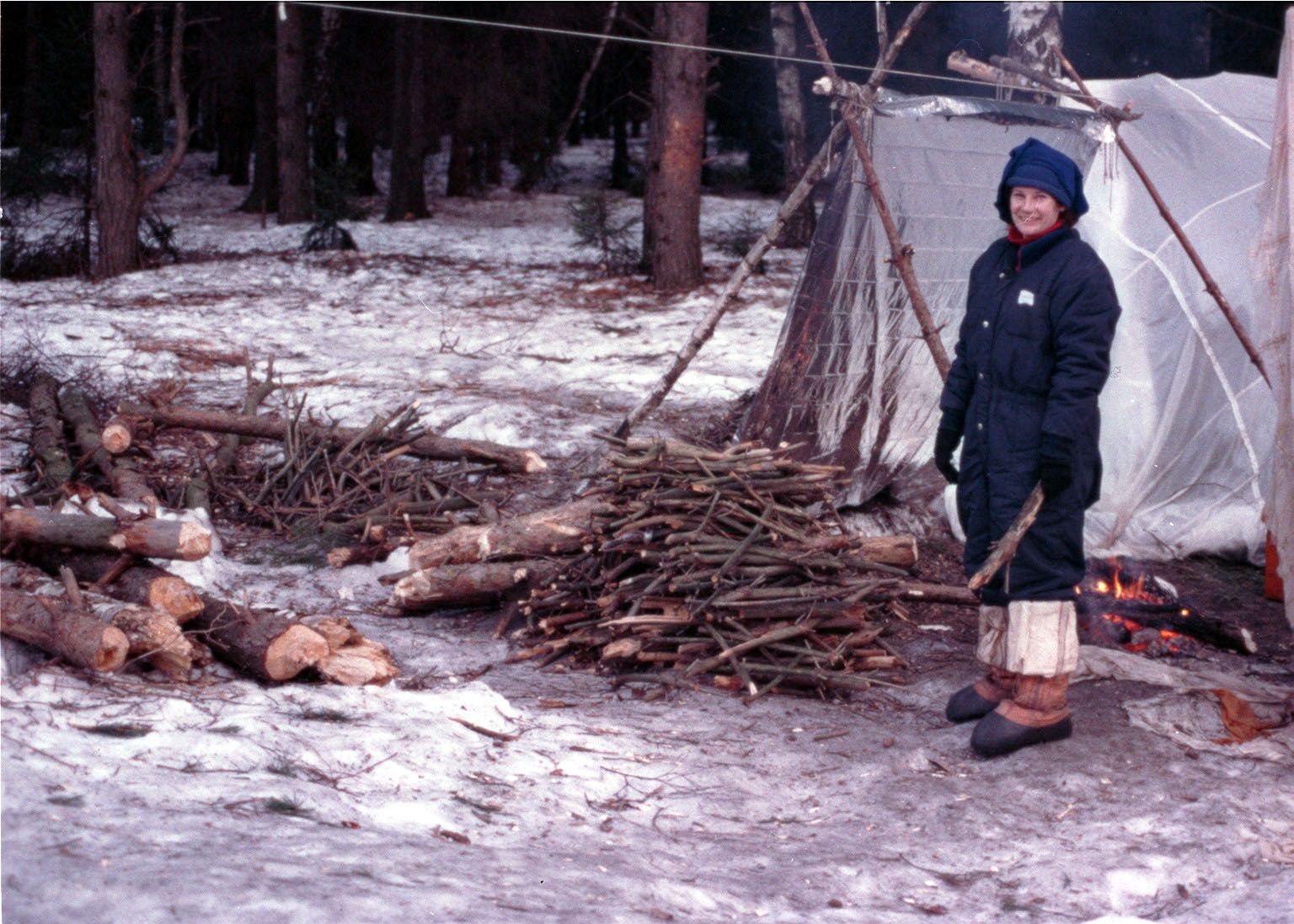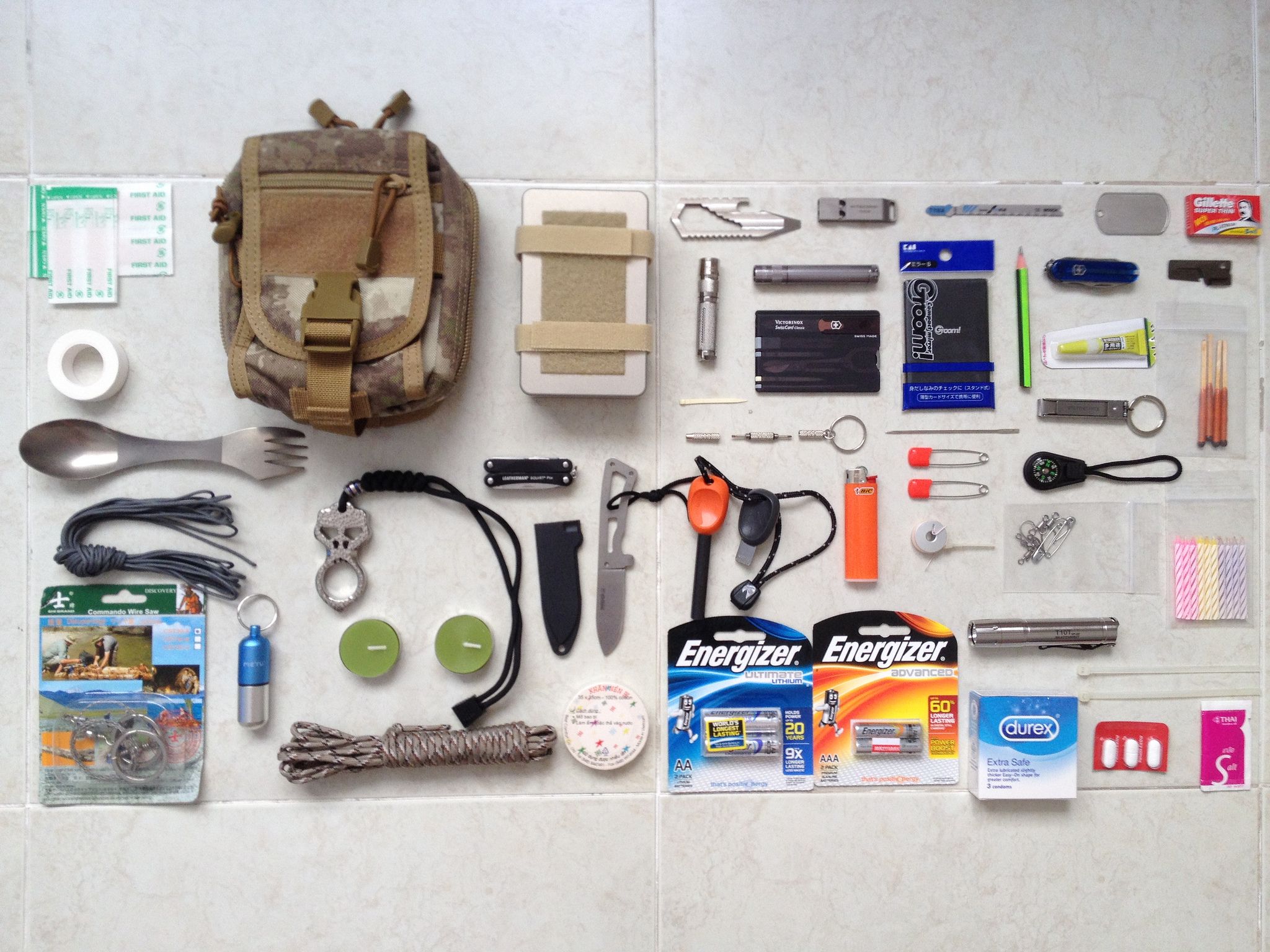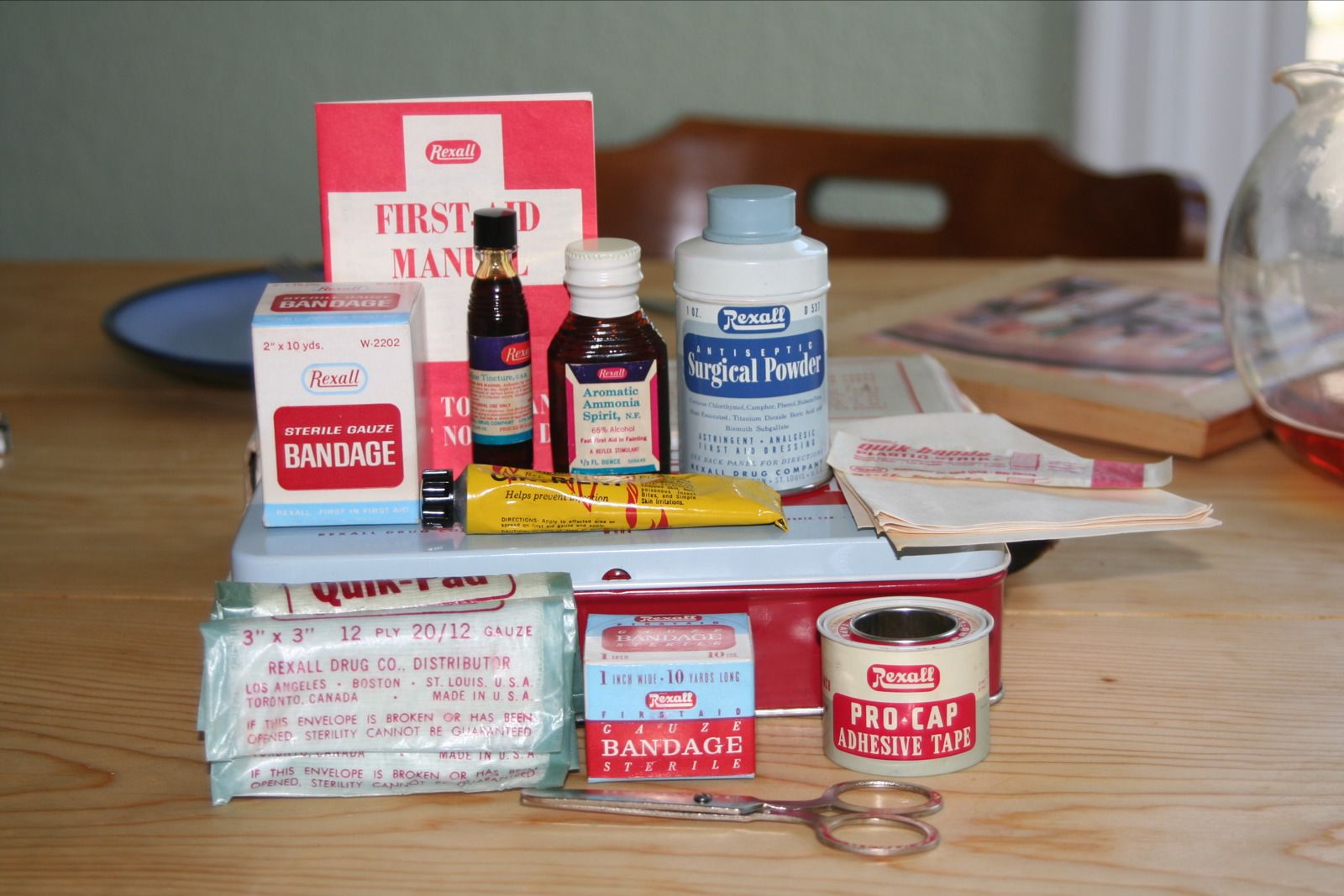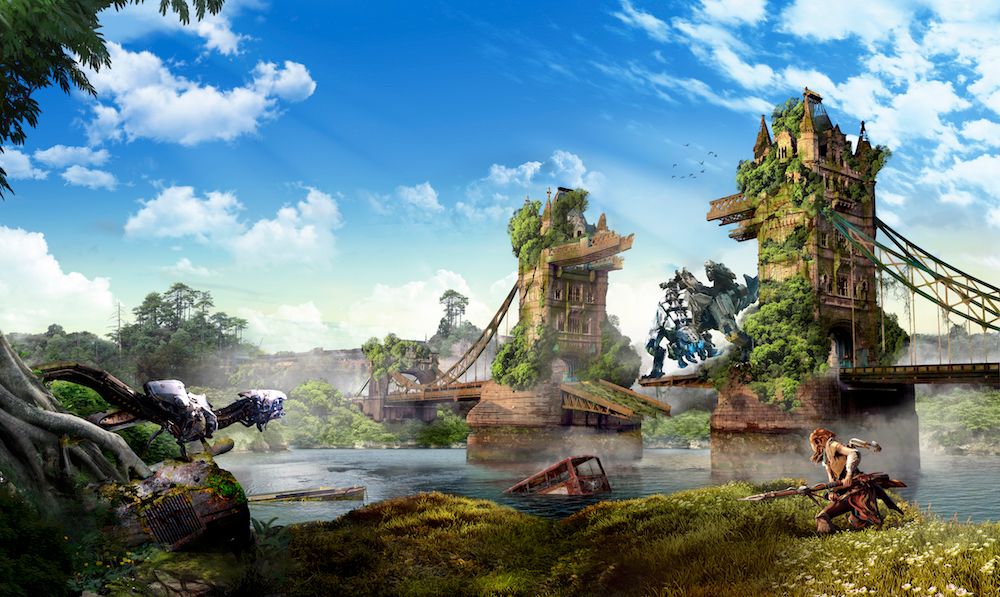So, you think the world might be ending?
You'd better do something about that then. We've all seen enough post-apocalyptic movies to know that it's not going to be pretty out there, so if you want to have any hope of surviving in the wild, you're gonna need some skills, knowledge and a sturdy pair of shoes.
As part of the release of the epic post-apocalyptic game
Horizon: Zero Dawn (out March 1), we spoke to
Steve Hart from UK Preppers Guide, who gave us some tips on what to do to prepare for the end of the world. In the wild, there's no prizes for coming last. There's no prizes for coming first either, you just don't die, so pay attention.
What’s your first priority in order to survive? What’s the first thing you need to do?

Photo: NASA
The top priority for survival is to act before any situation happens. It’s called ‘situation awareness’. Essentially it would mean: don’t put yourself in a danger situation in the first place, be aware of any danger around you and act accordingly to avoid it.
In effect, put as much distance between yourself and a potential survival situation as possible.
But in doing so, there's no use just running in any old direction hoping you’ll be OK. You must have a plan and survival gear to make a successful escape, so having a pre-built survival kit is essential. This kit must be easily accessible and available to just grab and go at any time.
What are the absolute 100% essentials you need to survive in the wild?
1) Survival skills knowledge. A good level of bushcraft skills is essential for survival in the wilderness.
2) Shelter. A shelter offers many comforts for wild survival, warmth and shade, as well as protection from the elements.
3) Water filtration and purification. A good means to filter water and make it safe for drinking in areas where there is no drinkable water to be found is crucial.
4) Fire-making tool. Being able to make a fire will offer many benefits for wild survival. Fire gives you a means to purify your water by boiling it, it offers warmth, a means to cook food and dry clothes.
5) A cutting tool. 90% of survival jobs will require the use of a sharp blade. This can be anything from an axe, machete, survival knife, or even a Swiss Army knife.
If you’ve got 10 minutes until your house is destroyed by some natural disaster, what household objects should you grab?

Photo: twintiger007
Everyone should have an emergency bag, normally a rucksack, with the equipment to help survive for a minimum of 72 hours. In the survival world these are called bug-out bags. It would only take a minute to pick up, and you’ll have it on your back and out the door very fast.
Equipment would include:
• Small shelter
• Sleeping kit
• Water filter
• Fire starter
• Knife and multi tool
• Head torch (preferred over a hand held, as you have both hands free to work)
• Dehydrated emergency food pack and energy snacks
• Any personal medication
• Emergency first-aid kit
• Change of clothes and boots (attached outside ready to be put on once away from danger)
• Cash (minimum £100), copy of driver’s license and passport, and important contact numbers, though these may be less useful after the apocalypse
• Survival manuals (compact) – SAS survival, foraging for food, medical manual
Water is obviously going to be important - how can you tell when water is safe to drink?
There is no way you can tell if water is contaminated or not, however there are signs to look for which will indicate the level of risk you are taking if you decide to drink it.
The essentials for collecting water to drink are:
1) Always choose water from a running water source, not from still water
2) Draw the water from just below the surface for running water
3) Go as far upstream to collect as possible. The further downstream you go, the more chance of something being in the water that would contaminate it.
4) Always choose a water source that looks as clear as possible.
5) Water that runs down to the ground and rock and feeds down from hills is a very good source, as it has been naturally filtered along the way.
6) Never drink water from a pond or non-running source.
To get rid of the larger contaminates, you can run the water through a makeshift filter. Initially this could be through a shirt, then through a bottle filled with small stones, then on to filter through sand.
This will not completely filter out contaminates, but you are increasing your chances of drinking safer water. Finally boil the water - sit at a rolling boil for a minimum of three minutes to kill off as much bacteria and contaminants as possible.
If you take ill or get injured in the wild, how can you increase your chances of survival?

Photo: WikiMedia
This is very dependent on what type of illness or injury you suffer - you can die from a simple scratch if the wound becomes infected and gets gangrene.
Carrying an effective first aid medical kit is essential for all wild survival. Not just some pre bought kit, but a specific survival medical kit. This would include:
• Various anti-histamines, antiseptic cream, pain killers, sun cream, diarrhea tablets, eye drops.
• Blood clotting agent, pressure pad, tourniquet, sutures.
• Plasters, bandage.
• Suture scissors, tape, surgical gloves.
• Most importantly – carry an emergency first aid manual
What are the most effective weapons and tools you can craft with minimal skill?
You must look to nature to see what tools can be fashioned effectively. Wood is your main choice. For example, you can create a decent knife as a weapon by simply selecting a tree branch and sharpening on a rock - very basic but effective.
Cooking racks and stands are easily made from wood, using the ‘Y’ shape of a branch as end stands. If you have a cutting tool with you, then you are able to make a whole host of survival equipment – from a simple spoon right up to building yourself a wooden shelter.
What kind of skills should everyone teach themselves in case the apocalypse happens next week?

Photo: Horizon: Zero Dawn
It’s unlikely you could learn a great deal in a week. However, basic survival skills include:
• Any basic bushcraft/survival skills
• Learn how to make a fire with minimal tools
• Learn first aid and medical treatment
• Learn hunting skills - fishing or trapping
• Learn how to forage woodland for food
If you meet a stranger in the post-apocalyptic wilderness, how can you tell if you can trust them?
Everyone should be approached with caution in this scenario, as it would be a very much dog-eat-dog society for some time. Ask yourself these questions: “Why do I need to trust this person?”, “Do I need them to help me survive?” and “What benefit are they to me?”
This may sound harsh, but providing you’re not injured or desperately in need of help, you’re better off fending for yourself in the initial stages. Most people will not have a clue how to survive and will become a burden.
Realistically, how long have we got until we need to put all this into practice?
 Photo: Los688
Photo: Los688
As the Doomsday Clock gets ever closer to a global meltdown, it is still unknown as to when this will happen. It may even be a slow process, creeping up on us gradually. Changes made over a long period of time go unnoticed, and therefore are accepted and considered the norm.
These changes could result in the downfall of society. Scientists have proven the vulnerability of the Earth and can chart the progress of global events, giving realistic timeframes for apocalyptic events that we seem to have little power in preventing. But the real answer remains unknown - that's why we should be prepared.
Horizon Zero Dawn will launch exclusively on PlayStation 4 and PS4 Pro on Wednesday March 1.





 This is very dependent on what type of illness or injury you suffer - you can die from a simple scratch if the wound becomes infected and gets gangrene.
Carrying an effective first aid medical kit is essential for all wild survival. Not just some pre bought kit, but a specific survival medical kit. This would include:
• Various anti-histamines, antiseptic cream, pain killers, sun cream, diarrhea tablets, eye drops.
• Blood clotting agent, pressure pad, tourniquet, sutures.
• Plasters, bandage.
• Suture scissors, tape, surgical gloves.
• Most importantly – carry an emergency first aid manual
This is very dependent on what type of illness or injury you suffer - you can die from a simple scratch if the wound becomes infected and gets gangrene.
Carrying an effective first aid medical kit is essential for all wild survival. Not just some pre bought kit, but a specific survival medical kit. This would include:
• Various anti-histamines, antiseptic cream, pain killers, sun cream, diarrhea tablets, eye drops.
• Blood clotting agent, pressure pad, tourniquet, sutures.
• Plasters, bandage.
• Suture scissors, tape, surgical gloves.
• Most importantly – carry an emergency first aid manual

 Photo: Los688
As the Doomsday Clock gets ever closer to a global meltdown, it is still unknown as to when this will happen. It may even be a slow process, creeping up on us gradually. Changes made over a long period of time go unnoticed, and therefore are accepted and considered the norm.
These changes could result in the downfall of society. Scientists have proven the vulnerability of the Earth and can chart the progress of global events, giving realistic timeframes for apocalyptic events that we seem to have little power in preventing. But the real answer remains unknown - that's why we should be prepared.
Photo: Los688
As the Doomsday Clock gets ever closer to a global meltdown, it is still unknown as to when this will happen. It may even be a slow process, creeping up on us gradually. Changes made over a long period of time go unnoticed, and therefore are accepted and considered the norm.
These changes could result in the downfall of society. Scientists have proven the vulnerability of the Earth and can chart the progress of global events, giving realistic timeframes for apocalyptic events that we seem to have little power in preventing. But the real answer remains unknown - that's why we should be prepared.